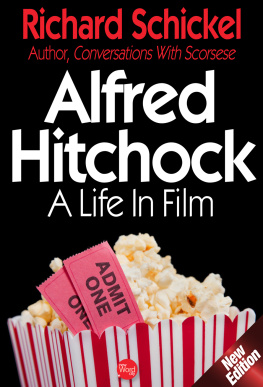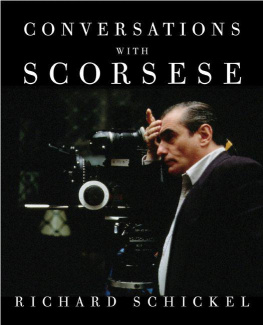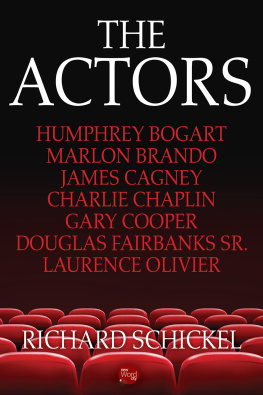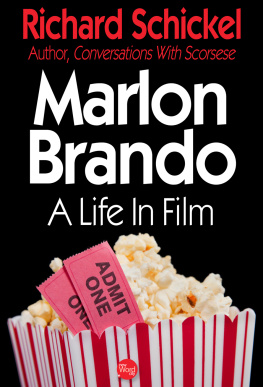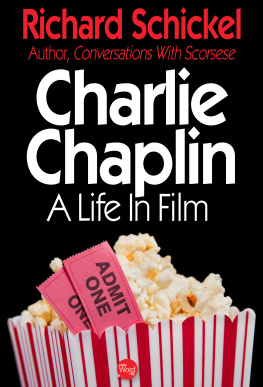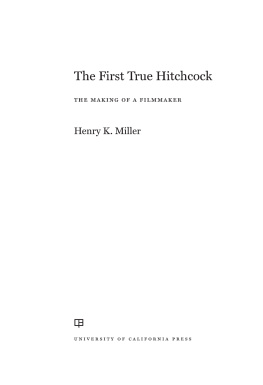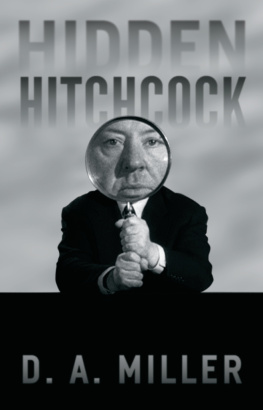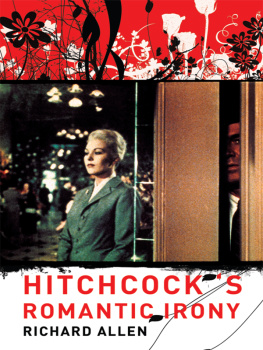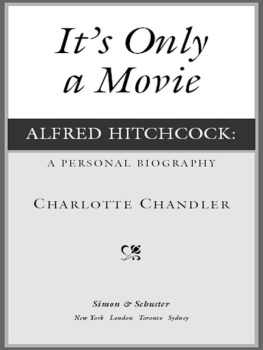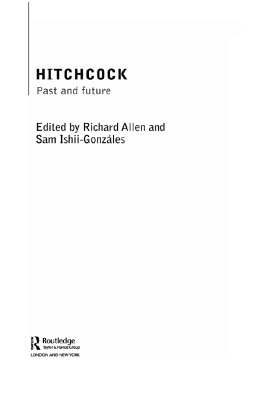Richard Schickel - Alfred Hitchcock. A Life in Film
Here you can read online Richard Schickel - Alfred Hitchcock. A Life in Film full text of the book (entire story) in english for free. Download pdf and epub, get meaning, cover and reviews about this ebook. year: 2013, publisher: New Word City, genre: Detective and thriller. Description of the work, (preface) as well as reviews are available. Best literature library LitArk.com created for fans of good reading and offers a wide selection of genres:
Romance novel
Science fiction
Adventure
Detective
Science
History
Home and family
Prose
Art
Politics
Computer
Non-fiction
Religion
Business
Children
Humor
Choose a favorite category and find really read worthwhile books. Enjoy immersion in the world of imagination, feel the emotions of the characters or learn something new for yourself, make an fascinating discovery.
- Book:Alfred Hitchcock. A Life in Film
- Author:
- Publisher:New Word City
- Genre:
- Year:2013
- Rating:5 / 5
- Favourites:Add to favourites
- Your mark:
- 100
- 1
- 2
- 3
- 4
- 5
Alfred Hitchcock. A Life in Film: summary, description and annotation
We offer to read an annotation, description, summary or preface (depends on what the author of the book "Alfred Hitchcock. A Life in Film" wrote himself). If you haven't found the necessary information about the book — write in the comments, we will try to find it.
Time magazines legendary, award-winning film critic Richard Schickel sat down on numerous occasions with frighteningly talented movie director Alfred Hitchcock. Spoiler alert: He learned what made the man behind The Birds fly. Here, in this short-form book, is Hitchcocks story.
Alfred Hitchcock. A Life in Film — read online for free the complete book (whole text) full work
Below is the text of the book, divided by pages. System saving the place of the last page read, allows you to conveniently read the book "Alfred Hitchcock. A Life in Film" online for free, without having to search again every time where you left off. Put a bookmark, and you can go to the page where you finished reading at any time.
Font size:
Interval:
Bookmark:
At a moderate hour each weekday morning not too early, not too late a moderate black automobile not too long, not too short (and driven by an un-liveried chauffeur) slid unobtrusively through the main gate at Universal City Studios, eased up the main street sound stages to the left, postproduction facilities on the right and pulled up at the side door of an unprepossessing stucco bungalow. There, it discharged a rotund black-clad figure, who quickly negotiated the two or three steps leading to the side door of his suite of offices. Inside, it was always cool and dark and hushed, a safe sanctuary not only from the Southern California sun but from the endless hurly-burly of show business trundling back and forth all day just outside its heavily draped windows. Unless he had to report to a set to direct a picture, a business he did his best to organize so that it required an absolute minimum of time and (above all) tribulation, Alfred Hitchcock did not leave this building until it was time to go home.
Not for lunch. Not even for Lew Wasserman. At the time we are talking about, the head of the studio, then the most powerful man in the motion picture industry, came to Hitchcock. Wassermans democratic habit was always to take his lunch in the studio commissary and to forbid room service to his employees. But for Hitchcock he made an exception to both rules. Hitchs meal never anything but steak or sole, with French fries for visitors was always brought over and served in his conference/dining room. And when they both were in town, Wasserman joined him there on Fridays.
What was good enough for Lew Wasserman who was a friend, and agent, before he became Hitchs indulgent employer was good enough for the rest of the world. Whether we were movie mogul or movie star, screenwriter or journalist, our needs for him, his needs for us were mutual. But we recognized there was no middle ground where he could meet us comfortably, so profound were his anxieties about the unknown and its potential for the unplanned, unprepared-for incident. So we came to him.
He talked about this anxiety quite openly in interviews. But the idea was so preposterous that a fair number of readers assumed it was a put-on, something like the persona he created for television shows he used to host the slightly macabre, perversely jolly fat man so obviously designed to preserve from prying eyes his private nature. It was, after all, difficult to believe that a man as wealthy, celebrated, and powerful as Hitchcock was so frightened that he might get a traffic ticket that he never learned to drive - or that when he traveled, he always booked the same rooms in the same hotels in order to avoid the unusual. Or that he would not venture out of these hostelries for days on end for fear of encountering the untoward. But the habit of caution extended to the smallest details of his life the unvarying diet, the unvarying black suit, for example. And I came to think the naivet - the almost comical childishness - of his methods of eluding (or was it placating?) ill chance (by which, of course, he actually meant malevolent fate) was the best evidence that he was in earnest about his anxiety.
One of his habits was more curious than the rest. He kept on his desk a copy of the master European railway timetable, a thick, densely printed tome. On idle afternoons, when he was between pictures, and between planning pictures (which took him much more time), he would thumb through this volume, planning long, complicated, entirely imaginary journeys marked by many extraordinarily close connections. His approach to this pastime was like his approach to moviemaking: first imaging a trip fraught with as many perils as possible and then imagining interesting, exciting ways of avoiding them by the narrowest possible margins. The ability to outwit fate within the imaginary narratives he created, and safely, sanely to conduct the process of creating them, granted him a sense of mastery that no amount of money or honors or respect could give him in life.
No wonder he could speak of, think of little else but his work. To him everything else was an infinitely menacing mystery. But movies, especially Hitchcockian movies, are a highly compressed narrative form, one which requires, unlike the novel, great selectivity in order to eliminate the kind of ambiguities and digressions that disturbed Hitch in real life. Moreover, though a movie set always reverberates with potential chaos, the closed doors of the sound stage and the directors status on that stage contain the chaos, give it finite, controllable dimensions. (Hitch naturally hated location work, probably the main reason his movies are so full of matte and process shots, which bring the outdoors in in a fully manageable form).
I loved listening to Hitch talk about the movies. We met when he agreed to appear in the pilot episode of a television series about movie directors I was doing, and, of course, he insisted on as much planning as possible. Later, we repeated these encounters when he asked me to host a closed-circuit TV press conference in aid of his next (and last) picture, FamilyPlot. As he was not busy just then Frenzy had just opened and he had not found his next project he was inclined to be free with his time. Moreover, he sensed in me someone who wanted to learn as much as possible about the technical aspects of his work how he had accomplished this shot or that and that encouraged his loquacity, too. There was a final element to his generosity. He had reached an age seventy-three when he was taking an interest in his posthumous reputation. If he judged an inquirer to be sympathetic and responsible, he was inclined to think of him as a keeper of the flame, someone who would help protect his reputation when mortality, the greatest mischance of all, left him vulnerable to his enemies.
He even tried to be autobiographically open with me, I think, though there a lifetimes habit of circumspection continued to tie his tongue. He would make an effort at personal recall, but it would render him uncharacteristically inarticulate. Like everyone else, I had to be content with the little anecdotes he had long ago worked up to explain how anxiety had entered his life. In one of them, he is a very small boy sent with a sealed note by his father to a neighborhood police station. The Bobby on duty at the desk reads it, beckons the child to follow, and without a word of explanation locks him in a cell. Five minutes later he reappears to let little Alfred out, saying he has been instructed to perform this small but infinitely sadistic act by the boys father, so he would know the inevitable fate of naughty little children. In another anecdote, he is sent off to a Jesuit school, the principal of which disciplines his students by beating their outstretched hands with a gutta-percha strap. The awful part of this thing to, say, a little boy of ten was that having been sentenced, it was up to him to decide when he should take... [the punishment]. He could take it at the first morning break, lunchtime, midafternoon, or the end of the day. And then you would go into this room, the priest would enter your name in a book, then grab the hand that was to be punished, and lay this thing in. Never more than three on a hand, because the hand became numb... So then they started on the other hand. And if, by chance, the crime was so great that you were sent for twelve... you could have only six one day and then the other six the following day. Well, this was... it was like going to the gallows.
Biographers have thrown some doubt on the literal truth of these stories, and there was something a little too practiced in Hitchs telling of them. But it honestly doesnt make any difference if they are untrue or half true. The first story is clearly a representation of Hitchcocks controlling fear, of false arrest and punishment; the second, of his abiding interest in anxious narrative. And both are little examples of how he discharged those concerns: by creating controlled stories about them. Psychiatrists tell you that if you trace your psychological problems back to childhood, all will be well, Hitch said. Of course, I dont believe that at all. No, patting them into a shapely tale was his way.
Font size:
Interval:
Bookmark:
Similar books «Alfred Hitchcock. A Life in Film»
Look at similar books to Alfred Hitchcock. A Life in Film. We have selected literature similar in name and meaning in the hope of providing readers with more options to find new, interesting, not yet read works.
Discussion, reviews of the book Alfred Hitchcock. A Life in Film and just readers' own opinions. Leave your comments, write what you think about the work, its meaning or the main characters. Specify what exactly you liked and what you didn't like, and why you think so.

